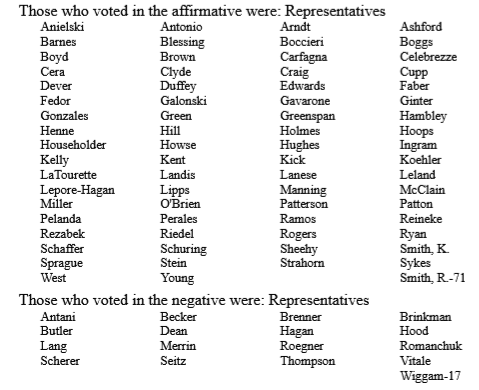What you need to know about Ohio Politics and Policy
Payday Lending Reform Clears the House, but Future Remains Uncertain
On Thursday, HB 123 cleared the Ohio House of Representatives after intense debate by a vote of 71 to 17. This legislation, modifying the Short-Term Loan Act, targets predatory lending practices by reigning in interest rates and setting limitations on monthly interest payments. HB 123 would strengthen Ohio’s regulations regarding the payday lending industry, which are some of the weakest in the nation. As a result of these weak regulations, borrowers in Ohio currently pay on average 591 percent APR (annual percentage rate) on loans, according to Pew Charitable Trusts research. This is the highest rate of any US state. To borrowers, this all-too-often translates to crippling debt and financial ruin. If approved by the Senate, the bill will lead to much more manageable interest payments. The bill, introduced in March of 2017, has had a long history marred by scandal and controversy. It has faced stiff opposition from the payday lending industry and its allies. According to Open Secrets, the industry has been an active player in Ohio politics, having made over $1.5 million in contributions since 2017, the vast majority going to Republicans. Payday lending reform has faced roadblocks from within the House as well, with lawmakers attempting to amend the bill in ways that would water down its effects. However, the largest twist involving HB 123 revolved around former Speaker Cliff Rosenberger, who resigned from his post after it was revealed that he was under FBI investigation. Central to this scandal are questions about the former speaker’s travel with payday lending lobbyists. Although the legislation made it out of committee shortly after former Speaker Rosenberger’s resignation on April 12th, it was unable to receive a floor vote until the House elected a new speaker –which did not happen until June 6th. This speaker vote was repeatedly delayed due to infighting and disagreements within the Republican caucus. After Speaker Ryan Smith was elected, a vote on HB 123 finally took place on the next day, June 7th. Overcoming stiff opposition by seventeen Republicans (see below for vote tally), the bill passed the House with 71 votes in the affirmative. Despite expectations that the bill would be amended on the floor as part of an attempt to weaken it, the version that passed the House was clean. However, the future of HB 123 is not yet certain. Even if the Senate does manage to vote on the bill before the end of session, it will likely face strong pressure from interested parties to make significant amendments.
(From opensecrets.org)
Tagged in these Policy Areas: Statehouse Update


